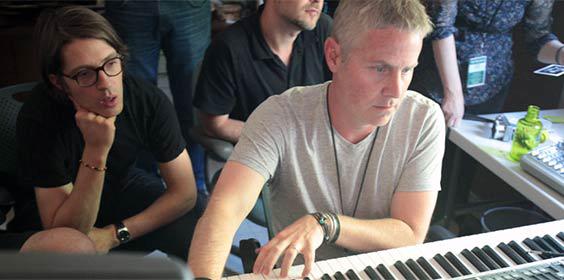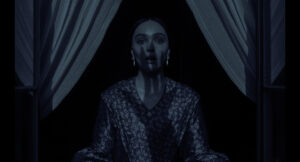Blake Neely (right) at the 2012 Composers Lab. ©Sundance Institute | Ryan Johnson
Nate von Zumwalt
It’s easy to dismiss musical composition as an abstruse kind of necessity in film and television.
It’s an element of the artistic equation that the average viewer knows little about despite its universal resonance. We’re acutely aware that Jaws’s most menacing moments would be toothless without its iconic John Williams score, or that The Social Network’s nefarious ambiance is owed to Trent Reznor and Atticus Ross’s calculated score, but that tends to be the depth of our wisdom.
For Sundance alum and recognized television and film composer Blake Neely, his grasp of the craft was once oddly similar. “As I watched Star Wars, I remember thinking, ‘I’ve never heard this music before, so it must have been written for this film. That must be a job.’”
Neely has served as a creative advisor at the Sundance Institute Composers Lab and scored the documentary The Case Against 8, which screened at the 2014 Festival. But both his breakthrough and stamina as a composer has been in television, beginning with Everwood, which earned him an Emmy nomination and catapulted him into a long run of work on other shows, including The Mentalist, Brothers & Sisters, and Arrow.
This weekend, he’ll join Sundance once again for our Film Music Lab, where top innovators in the world of music and sound for film and TV will convene for a daylong, in-depth conference. To get geared up for the event, we chatted with Blake about the artists, art, and media that have shaped his work.
TELEVISION
“There’s just something about The Dick Van Dyke Show and Leave It to Beaver that have moved me since I was a little boy. Perhaps it’s the nostalgia of watching them every day after school, or how well they were written, or both of their iconic theme songs. They were presenting such real situations about life but with such a lightness of touch. I strive for that same ‘everything will be okay’ feeling with my own music. Sometimes when I’m considering how to score a scene, I will tap into the memory of how those shows made me feel and try to create that feeling for a new audience.”
FILM
“Two films that immediately blew my mind: Star Wars and Heat. What composer within a decade of my age wouldn’t name Star Wars and its monumental score by John Williams as their biggest inspiration? I was 8 in Paris, Texas, in a dark theater, having no idea what to expect. Up to that point, I had been an avid classical music listener and was starting to compose music on the piano. As I watched Star Wars, I remember thinking, ‘I’ve never heard this music before, so it must have been written just for this film. That must be a job. I want that job!’ And thus the fire was ignited and the pursuit began.
“Almost 20 years later, I had another visceral experience as I watched Michael Mann’s Heat. This time it was about the music, although Goldenthal’s remarkably complex and nuanced score is a masterpiece. It was about the complete package of a film: its style, its tone, its sound, its feel. Heat didn’t seem like a movie to me; it felt like I was standing in it, living it beside the characters. I could feel it like it was real. Since then, I am inspired to attempt this with my own music: to create textures and sounds that can wrap around the listener and make them feel perhaps like they are part of the music.”
MUSIC
“A non-musician friend once asked me, ‘Have you heard of Arvo Pärt? There’s something so great about his music, even thought it sound like the orchestra is just tuning.’ I investigated, and my life literally changed on the first listen. I became obsessed, reading about his method, watching documentaries, attending concerts, buying and reading scores, collecting recordings. The purity, innocence, sincerity, emotional depth and, above all, clarity that that man can convey with even one note over one chord will forever drive me to be better. (Sidenote: my dog’s name is Arvo.)
LOCATION
“I know I should say I prefer to write at the beach or in a park or walking in the woods, but I’m truly my most creative self when I’m alone, very, very late at night, quietly working at my keyboard. That being said, the most inspired I’ve ever been by a place was Vienna, Austria. After four days of being surrounded by my hero’s legacies, I asked my hotel concierge if he knew where I could rent a piano room for a few hours, because I was inspired and needed an outlet. Turns out you can’t rent one.”
LITERATURE
“Cormac McCarthy’s The Road is one of the most inspiring books I have ever read. I’m a painfully slow reader, putting it away for weeks or months, but I started and finished The Road in one sitting. (Don’t be impressed; it’s short). I’m all about layers and texture and feel, as explained with the films and music that have inspired me. The Road is all of that and more. I was on that journey with them. I knew those two characters like my own family. I think I still grieve for them both. I always say that I like to tell stories with my own music. That story stays with me.”




